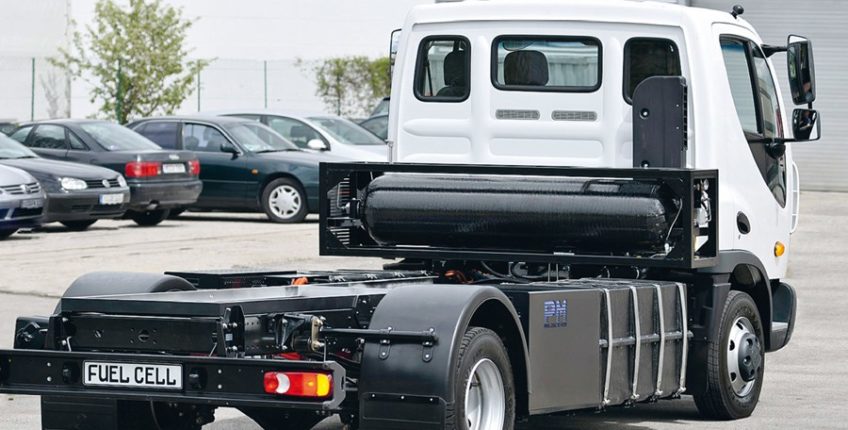The fuel cell range extender system for battery-electric utility vehicles was developed by Proton Motor Fuel Cell GmbH as a conceptual modular solution based on its own stack and system technology. The modular approach guarantees it can be implemented across various platforms and thereby ensures that fuel cell technology becomes accessible to a larger range of applications.
Cooperation with German contract developers and suppliers means the technological know-how and value-added chains remain in Germany. As one of just a handful of fuel cell manufacturers in the higher performance category, Proton Motor is striving for technological leadership in Europe with this development. Based on existing technology, a step-by-step adjustment to automotive requirements was conducted including mechanical stability, electromagnetic compatibility and starting ability in frosty conditions. To demonstrate usability from the very beginning, an existing 7.5 t battery-electric utility vehicle was selected. The project commenced in April 2010 with the creation and testing of a functional model. The development and testing of a test vehicle took place from January 2011. It was upon this basis that a second, improved prototype was built and tested in 2012. From 2013, this vehicle was then used by various operators for testing its suitability for everyday use under real conditions.
Due to its modular design and the development of standardised interfaces, a universally adaptable fuel cell system could be developed. The involvement of the SGS-TÜV testing organisation from the very beginning enabled us to obtain approval for use on European roads in accordance with guideline 79/2009/EC. An important prerequisite for this was the intelligent safety system, which was also developed by Proton Motor. To document the potential economic success of this technology, a comprehensive TCO (Total Cost of Ownership) analysis was prepared together with the Technical University of Munich.
Difficulties arose due to a limited and sometimes lacking availability of suitable components. Some of these components needed to first be developed according to specifications, e.g. the DC/DC converter for the voltage ranges required in the automotive area. As hydrogen and fuel cell technology is still largely unknown at the respective authorities, significant bureaucratic hurdles needed to be overcome in the approvals process. The biggest challenge in the search for operators willing to test the vehicles in everyday use was, however, the largely non-existent hydrogen infrastructure.
The fuel cell range extender is an ideal solution to supplement electromobility as it preserves emission-free mobility while simultaneously expanding the potential application spectrum to include those instances where normal battery capacity alone would be insufficient.
Funding Code
03BS107
